LEND Discipline Meeting: OT & PT
March 3, 2007
Meeting Notes & Photos
Crystal Gateway Marriott, Salon A
The MCHB-AUCD Discipline Meeting for LEND Occupational Therapists and LEND Physical Therapists was held on Saturday, March 3, 2007, in Crystal City, VA. The meeting was attended by nearly 50 faculty, staff, and trainees from the AUCD network, as well as representatives from AUCD, MCHB, and APTA.
Overview of MCHB
The morning began with an overview of the Maternal Child Health Bureau (MCHB)
by Denise Sofka, RD, MPH. Denise is one
of the Federal Project Officers, along with Madhavi Reddy, MPH, who oversees
the LEND Programs. Denise described how
LEND programs fit into the "big picture" of the federal government and their
funding stream, and provided an overview of the MCH Training Portfolio. She also described the training priorities of
MCHB and a brief history of the LEND program.
Visit the MCHB Training Website and the MCH Timeline.
Overview of AUCD
Next, Crystal Pariseau, MSSW provided an overview of the Association of
University Centers on Disabilities (AUCD).
She described the depth and breadth of the 35 LEND programs and
discussed the two other networks that make up AUCD: UCEDDs and DDRCs. Crystal
encouraged attendees to visit the AUCD website, specifically the LEND section,
the OT & PT sub-sections, and the Trainee section.
Panel Presentations
At 9:00am, panelists from four different LENDs presented brief profiles of
their programs.
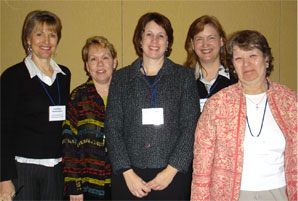 |
|
Panelists, from left: Kathie Washington, Sue Wendel, Lynn Jeffries, Jayne Shepherd, Judy Drews |
The panelists identified the structure and characteristics of their LEND training program, discussed recruitment efforts, unique program and trainee experiences, and challenges they face.
- Judy Drews, PhD (Civitan International Research Center, Birmingham, AL)
- Kathie Washington, PhD, & Sue Wendel, MS OTR, (Center on Human Development and Disabilities, Seattle, WA)
- Lynn Jeffries, PhD, (Center for Learning and Leadership, Oklahoma City, OK)
- Jayne Shepherd, MS OTR, (Partnership for People with Disabilities, Richmond, VA)
Small Groups
After a brief break, meeting attendees broke into small groups to discuss
issues identified during the panel presentations. The groups then reconvened into one large
group and summarized their discussions.
Notes from each group are listed below.
Training Length, Funding, & Student Requirements
- How
do you fund trainees? Compilation and
creativity.
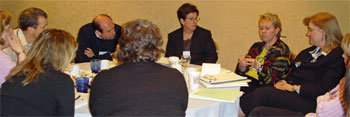
Discipline Meeting Small Group - Where does contract money go?
- Agencies are often willing to pay for contracted services - some LENDs can discount those services
- Which places have PT/OT programs?
- Pre-professionals vs. post-professionals and the associated challenges and rewards
- How do you recruit for post-professionals and make it feasible and more lucrative for them?
- Some LENDs offer graduate credits. Who pays for graduate coursework?
- Disability certificate programs
- Residency program - issues and opportunities, creating post-professionals that might be able to bill for services
- Build components of LEND programs into residency programs
- How do you make it interesting for people to spend 9-12 months in program? Salary, health care, etc.
- Help everyone make a lot more money! Make participation more feasible and practical.
Interdisciplinary Teaming in LEND
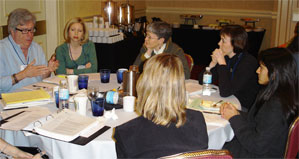 |
| Discipline Meeting Small Group |
- Program-specific ideas for interdisciplinary training
- Home visits prior to an evaluation: family faculty takes a trainee from one discipline into the home to interview the family about what the family hopes to get out of the evaluation
- Go into the school and ask what they hope to get out of an evaluation. LEND may be able to bill for school visits
- Trainees shared perspectives about how and why they came to interdisciplinary training, how they sold it to their employers, and ideas on how to encourage employers to support sending trainees to LEND programs
- Transdisciplinary models - programs are beginning to mandate a transdisciplinary approach
LEND Connections between the Hospital/Clinic & the Community
- How do you deal with orientation if multiple sites are involved?
- One-day orientations where intern is participating
- Using technology to implement consistency across programs-some programs are moving toward web-based orientation so everyone is getting the same information
- Moving from LEND into the field-have a component of field work that is tied to LEND internship
- What would be the requirements for mentorship, expectations of field work environment?
- Explore community resource contracts where LEND faculty are the providers of services
- Use past LEND interns as resources and mentors in community settings
- Transdisciplinary vs. interdisciplinary and impact on LEND trainees -support LEND trainees to be agents of change
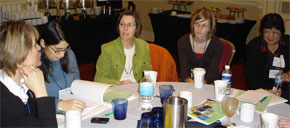 |
| Discipline Meeting Small Group |
Community Based Programs and their Integration into LEND
- Very diverse - everybody does it a little bit differently
- Begin with needs assessment then look at where to go in the community
- Different models
- WV had funding for a van that went to different rural areas to provide services
- UT - distance education as well as traveling to communities
- Family focus - how to make clinics more family-friendly
- Medical home, family supports
- Family mentor introduces family, goes through process, and follows up with families a few months later to see if suggestions helped
- Liability
- Students in courses are covered by university liability policies
- If program does not include university coursework then need to address liability coverage
- Funding-will there be more funding for LENDs from appropriations coming out of Combating Autism Act?
Diversity in LEND Training
- Both OT and PT professions have had a goal of recruiting diversity for years
- Can't do it alone-programs should try to work with university diversity recruitment programs and get OT/PT information incorporated into those programs
- Start recruitment at high school or early undergraduate level
- Bureau for Health Profession Training Grants
- Make programs accessible and affordable for diverse populations. Is housing affordable, can schedules be flexible, etc.?
- People don't always know about LEND programs. Make connections with professional organizations-AOTA, APTA, etc.--so people will know the programs are available
- Make contracts with schools farther away that may have diverse populations so you can bring diversity into LEND training
After lunch, meeting attendees separated to have discipline-specific meetings.
Occupational Therapy Meeting
The majority of the OT meeting centered on supporting research and student
research initiatives; Anne Cronin (West Virginia LEND) led the discussion.
- Folding research into the LEND programs.
- Make programs stronger by working together.
- Introductory comments from Anne regarding integrating research into her LEND program, what worked, what didn't work.
- Several participants were unhappy that a representative from AOTA did not attend the Discipline meeting and that there is very little awareness of LEND programs by AOTA. Anne responded that AOTA was invited and unable to commit to attend because of a standing scheduling conflict.
The OTs suggested several work groups for the future
- Form an AOTA liaison work group to increase awareness of LENDs at AOTA.
- Review post-graduate specialties and make a list available across LEND network via the AUCD website.
- Website group to work with AUCD about increased OT content, including post-graduate programs; nature of each LEND program and how they operate; whether they have professional training and what training they support; post information about current research projects. Website group will conduct survey.
- Autism-organize work group to form strategic plan for research/data sharing project with Autism programs to grab some of the increased funding from Combating Autism Act. Conference call?
- Not an official work group yet, but there would be interest in attending a second OT discipline meeting. Add it on as half-day meeting after Annual Meeting? [Project - organize another OT discipline meeting?]
- Should there be collaboration with PTs? There continues to be a need to educate funders and others about difference between OT and PT disciplines. [Separate discipline sections on LEND website for OT and PT?]
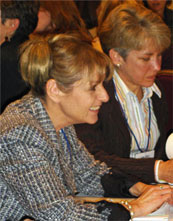 |
| Toby Long, PhD, CNMC, DC LEND |
Physical Therapy Meeting
During the PT meeting, Janet Crosier of APTA gave a presentation on the
American Physical
Therapy Association (APTA). She and meeting attendees brainstormed ways to more strongly connect AUCD/LEND programs and APTA, as well as possible ways to use APTA as a recruitment tool for LEND. The PTs also spent time discussing Pediatric Fellowship/Residency programs; Toby Long, PhD (CNMC-Washington, DC) led the discussion. Anne Turner, MPT, and trainee Katie Laubscher (Oregon Health Sciences University, Portland, OR) shared their experience as the first LEND to have such a program.
Group Discussions
The remainder of the afternoon was devoted to topical small group
discussions. Participants were offered
five different topics and were able to rotate between two.
Transition to adulthood and training about adults with DD within LEND
- It is a growing issue. Children are living into adulthood, there are more children that have received services, families are expecting to receive services and they are not available for children when they reach adulthood.
- Transition from childhood to adulthood in terms of receiving health care services is an issue that is being discussed across disability organizations. Perhaps LEND is a good place to pull all of those discussions together and make recommendations for services for adults with DD.
- Understanding that you can't provide a 15-minute service for a knee problem to an adult with autism-it may take an hour and there are billing rates and other issues that come up.
- Capitalizing on the strengths of individuals or individual programs across the country through the LEND network to build strong Fellowship/Residency programs
- Focus on building strong networks and how that can help build strong residency programs
- Use web conferencing to share information-connect geographically dispersed programs and trainees for instruction. Do LEND programs have technical capacity to do this? Cost, funding, equipment. Create CDs. Offer CEUs for online courses.
- Website development-how to do more with LEND website. Post clinical opportunities, training and research opportunities. Use website to increase awareness around advocacy. Certification process.
Leadership training and promoting the LEND experience as part of the professional development and career path
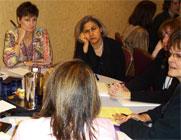 |
| Discipline Meeting Small Group |
- The importance of networking and working together
- How do LEND trainees and faculty network with professional associations (AOTA, APTA, etc.)?
- Add compendium of leadership activities to AUCD website.
- Use distance learning to collaborate on training?
Mentorship of practicing therapists; non-traditional trainees; beyond continuing education
- Practicing therapists modifying their work schedules and using the remainder of their time as LEND program time and LEND stipend would offset their reduction in salary-to enable professionals to take advantage of LEND program.
- Partnering with employees to create some kind of exchange of training
- Continuing education-does LEND also have a responsibility to provide continuing education to practicing therapists? I.E.: Short continuing education opportunities-half-day or few hour seminars. Look at topics that basic continuing education courses don't cover. Also provide trainees an opportunity to participate in those courses.
- Ask child's community therapist to participate in the evaluation process
- Web conferencing-are there therapists in geographically dispersed areas that would benefit from regular online meetings for mentoring, sharing information
- Provide LEND training opportunities to community therapists in a structured program. I.E.: Therapists would participate in program one day per week for 10 weeks-enable them to seek a mentoring program and create a different way to provide a LEND training experience.
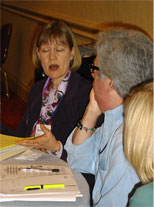 |
| Discipline Meeting: Anne B. Harris |
Cultural competence, diversity training and recruitment issues
- We have to look at ourselves first and our trainees. Do self-assessments within universities. But it doesn't mean you're culturally competent just because you go through a training module.
- Vermont-has people from diverse populations come in to do training, or they bring trainees to diverse communities/families.
- Learning about how to learn about the culture and then finding out what resources are available.
- National Center for Cultural Competency training modules
Results
One of the goals for the meeting day was to generate a list of potential
activities or projects on which meeting attendees and other network OTs &
PTs could continue to collaborate in the future. Below is that list. Meeting attendees who volunteered to help
organize or chair an activity are noted where available. LEND OTs & PTs should expect to be
contacted by Crystal Pariseau (AUCD) regarding participation on the various
activities.
Emerging Issues and Projects: What do we want to do next?
- Create OT and PT listserves. (AUCD)
- Make sure LEND link is on pediatric section and APTA websites (Priscilla Osbourne)
- Website group to work with AUCD about increased OT content, including post-graduate programs; nature of each LEND program and how they operate; whether they have professional training and what training they support; post information about current research projects. Website group will conduct survey. Collaborate with PT to draft survey. (Sandy Heimerl, Liz Ridgway)
- Schedule topical conference calls every couple of months, possibly web conferences as technology becomes available (OT and PT members will initiate, AUCD will organize)
- Go to APTA website > member services > "Members Mentor Members" program and sign up as mentors (All)
- Form an AOTA liaison work group to increase awareness of LENDs at AOTA. (Larry Zachow)
- Review post-graduate specialties and make a list available across LEND network via the AUCD website. (Kim McKearnan)
- Autism-organize work group to form strategic plan for research/data sharing project with Autism programs to secure some of the increased funding from Combating Autism Act. (Anne Cronin, Alice Kibele)
- Explore pediatric residency issue - three more programs (Judy Drews)
- Develop a library/listing of distance education/virtual materials available. Establish guidelines for website repository (abstracts, document types, media, etc.). (Trainees?)
- Trainee perspectives on how they came to LEND and how they sold it to employers. How to approach agencies to recruit trainees, highlight benefits, return on investment. (Hawaii)
- Needs of adults with DD-develop a statement about the needs and possible contributions that OT and PT might make and the necessary competencies. Make it an OT and PT trainee activity. (Katie Laubscher, Erin Enright)
The meeting was adjourned at 5:00pm.
Credits
Many thanks are owed to the individuals who worked to plan this meeting agenda and helped to make the day a success:
- Anne Cronin, PhD, Center for Excellence in Disabilities, Morgantown, WV
- Judy Drews, PT PhD, Civitan International Research Center, Birmingham, AL
- Alice Kibele, PhD OTR/L, Childrens Hospital Los Angeles, Los Angeles, CA
- Lillian Kornhaber, Rose F. Kennedy Center, Bronx, NY
- Evette Mezger, Director of Information Services, AUCD, Silver Spring, MD
- Priscilla Osbourne, MS PT PCS, Institute for Community Inclusion, Boston, MA
- Crystal Pariseau, MSSW, LEND Project Coordinator, AUCD, Silver Spring, MD
- Liz Ridgeway, BA, Rose F. Kennedy Center, Bronx, NY
- Louann Rinner, MSEd OTR/L, Developmental Disabilities Center, Kansas City, KS
- Jayne Shepherd, MS OTR FAOTA, Partnership for People with Disabilities, Richmond, VA
- Denise Sofka, RD MPH, HRSA-MCHB, Rockville, MD
- Lana Warren, MS EdD, Kennedy Krieger Institute, Baltimore, MD
- Kathie Washington, PhD PT, Center on Human Development and Disabilities, Seattle, WA
- Sue Wendel, MS OTR, Center on Human Development and Disabilities, Seattle, WA
- Agenda {pdf: 107kb}
- AUCD PPT {pdf: 1106kb}
- AUCD Brochure (pdf: 765kb}
- LEND Brochure {pdf: 7mb}
- AUCD Network Report FY2006 {pdf: 279kb}
- MCHB PPT {pdf: 13mb}
- OT & PT Discipline Survey: "Getting to Know You"
- Survey Questions {pdf: 45kb}
- Survey Results {pdf: 511kb}
- APTA Handout: 2006 Legislative Agenda: Physical Therapy and the 109th Congress {pdf: 1505kb}
- APTA Handout: Clinical Residency and Fellowship Program Credentialing: Frequently Asked Questions {pdf: 259kb}
- Panel Handouts:
- Judy Drews, Alabama {pdf: 40kb}
- Kathie Washington & Sue Wendel, Washington {pdf: 24kb}
- Jayne Shepherd, Virginia {pdf: 226kb}
Reimbursement
All meeting attendees are eligible for limited travel reimbursement, with proper receipts, of up to $250. To receive reimbursement, complete this form and return with copies of receipts to AUCD c/o Crystal Pariseau not later than April 13, 2007. For more information, read the AUCD travel policy.







